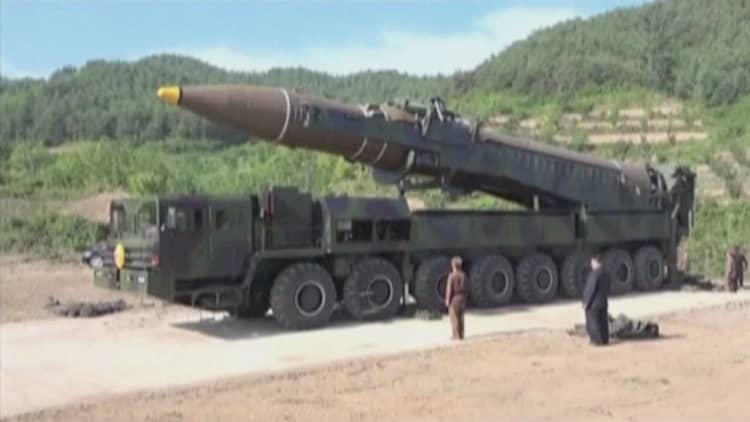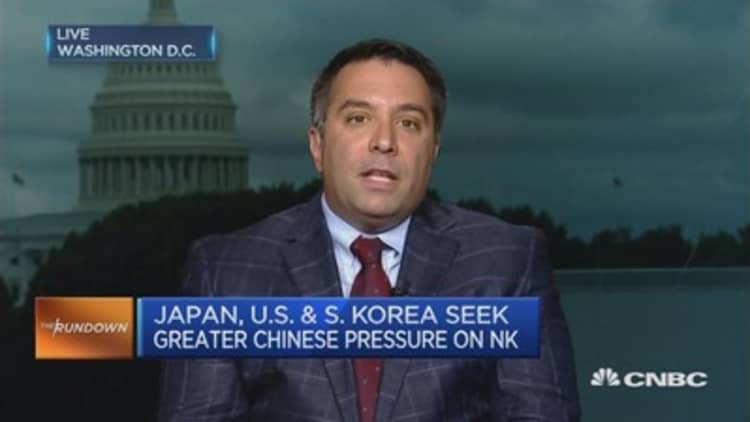
The United States is not interested in making concessions to North Korea anytime soon, following what is widely believed to be that country's first launch of an intercontinental ballistic missile (ICBM), according to analysts at research firm Eurasia Group.
Evan Medeiros, managing director and practice head for Asia at Eurasia Group, wrote in a July 6 note that the Trump administration will instead focus on maximizing pressure on North Korea.
In a previous note from June — before North Korea launched its latest missile test — the firm explained that U.S. strategy may include pursuing a freeze, reduction and eventual elimination of North Korea's nuclear program. That would likely be demanded in exchange for security assurances and sanctions relief, but the analysts said they are skeptical those offers would be enough for dictator Kim Jong Un.
Other options include stepping up sanctions on entities outside of North Korea that are seen as helping the regime. Another remote possibility is military action.
"Every new North Korean military provocation raises anew the question: is a diplomatic option viable and/or likely?" Medeiros said in the most recent note.

He added, "We assess there is only a 20 percent chance that the U.S. will pursue a diplomatic solution in this time frame," referring to the next six months to a year.
An end to military maneuvers? Don't count on it
Medeiros explained there are a number of reasons why concessions are probably off the table: first, the United States and South Korea will not accept any freeze on their joint military exercises — something the North Korean regime wants. China — North Korea's only real ally and trading partner — issued a call, with Russia, for such a freeze this week.
"Both Washington and Seoul believe that accepting this deal would undermine the credibility of the alliance, potentially leading to a rethinking of commitments or even an unraveling of the whole alliance," said Medeiros.
Washington will encourage, coerce and bribe as much cooperation from South Korea, Japan, China, ASEAN and the EU as possible.Evan MedeirosEurasia Group
Such a freeze would also imply "strategic equivalence between North Korea's military program and U.S. and South Korean military exercises," he said, adding accepting such a proposal could open the door for North Korea's attempts to "negotiate away U.S. forces as part of a future peace agreement."
Harry Kazianis, director of defense studies at public policy think tank Center for the National Interest, said Trump's response will be watched closely because as president-elect, he promised that North Korea would never obtain long-range nuclear capability.
"I think the choices in front of the president are very clear: Military action is not something that is really viable unless you want to start basically world war three," he told CNBC's "The Rundown" on Friday. He added that Trump will likely try to lead the international community, including China, on a containment strategy against North Korea.
Other experts have previously said that convincing China to crack down on Pyongyang will be difficult, because Beijing does not want to a unified, U.S.-allied Korea right on its borders.
If we're able to raise the cost of Pyongyang building these programs, and make it prohibitively expensive for them to do that, I think we'd have done a good thingHarry KazianisCenter for the National Interest
An option for the United States is instead to go after individual companies, including those in China, that are essentially helping North Koreans "launder money," Kazianis said. And in fact, the United States recently has signaled that it is willing to do just that.
"These are the entities that are basically the life blood that fuel North Korea with hard currency — currency that they can go out and get help to build their nuclear missile programs," the analyst said.
Medeiros of Eurasia Group added, "Over the next 6-12 months, the focus of U.S. policy is going to be pressure, sanctions and isolation via economic, diplomatic and military means. Washington will encourage, coerce and bribe as much cooperation from South Korea, Japan, China, (the Association of Southeast Asian Nations) and the EU as possible."


